 |
 |
|
EUSA Newsletter 06-2024, ISSN 1855-4571
|
Representatives of national university sports associations (NUSA) had the opportunity to visit the cities of Debrecen and Miskolc, Hungary, from 22-23 of May, to get acquainted with the ongoing preparations for the European Universities Games 2024. They were hosted by the Organizing Committee and EUSA Representatives. The two-day program, which consisted of various activities, started on Wednesday in Miskolc, with the general meeting held in the meeting room of the Aurora Hotel. The present attendees were welcomed by the speeches of HUSF Secretary General, Mr Peter Juhasz; OC Managing Director, Mr Szabolcs Biro; OC Project Leader Laszlo Vegh; EUSA Sports Manager Miha Zvan; and EUSA Consultant Natasa Jankovic. All of the speakers expressed their convictions that EUG2024 will be an amazing event, with a great atmosphere, as well as pointing out the importance of teamwork and cooperation of the NUSA and University representatives in the preparation of the event - before and during the games - to ensure smooth running and big success. The strategic importance of having two cities hosting the event was noted, together with the responsiveness of the OC staff. All the involved people in the organization proved to be very helpful and ready, as well as engaged and "in love" with the event itself. The warm welcoming part was followed by a presentation about the staff members of the OC, which will be hosting more than 5000 participants, competing in 17 sports. Members of the OC displayed all the progress reports consisting of information about the accreditation system, registration information, sports venues and disciplines, transportation details, accommodation, catering and volunteering, and communication and marketing. This first part of the working activities ended with a fruitful Q&A session, where the NUSA representatives had the chance to discuss their necessities and needs. The second half of the day included visits to venues and facilities in the University of Miskolc campus, such as the dormitories, the catering area, places designated for the NUSA Offices and accreditation center as well as sporting venues such as the Generali Arena and the DVTK Arena, where the Games Opening Ceremony will take place. On Thursday, May 23, the attendees along with the OC staff members, moved to the city of Debrecen, visiting also in this city all the venues where the competitions will take place, followed by visits to the catering locations, offices, and spaces designated for NUSA, the accreditation venue and the dormitories of Debrecen University. During these visits, the NUSA representatives had the chance to inspect and get more detailed information about the courts and competition areas. As for the wrap-up of the day NUSA and EUSA representatives had the opportunity to share impressions and receive answers to their questions from the organizational committee of EUG2024 during a final Q&A session, aimed at NUSA to obtain more specifics about operational details to get the best out of this summer's two-week event. NUSA Coordination Meeting marks an important checkpoint before the European Universities Games which will be held from 14-24 of July, in Debrecen-Miskolc, Hungary. Representatives from The Netherlands, Hungary, Poland, Croatia, Germany, France, Portugal, Norway, and Türkiye, attended this NUSA Coordination Meeting, together with some representatives from next summer's FISU World Universities Games. The European Universities Games in Debrecen-Miskolc are being organized under the license of the European University Sports Association (EUSA) by MEFS, University of Debrecen, University of Miskolc, City of Debrecn, City of Miskolc, in cooperation with several partners, including the National Event Agency, and co-funded by the Erasmus+ Programme of the European Union. More information...
Results of 2023 PPPA call are out
03 May 2024
|
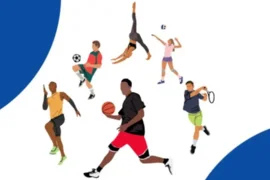
|
|
European Education and Culture Executive Agency (EACEA) of the European Commission recently published the results of the 2023 call of the Sport Pilot Projects and Preparatory Actions (PPPA). We are happy to announce EUSA's project proposal is one of the selected ones!
|
Special celebrations of Europe Day and Week in 2024
09 May 2024
|
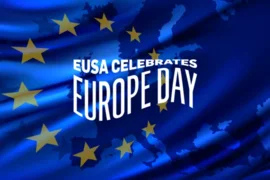
|
|
Europe Day is a day celebrating peace and unity in Europe. The main celebrations are annually marked by the Council of Europe (on May 5) and by the European Union (on May 9). Often, the celebrations are joined as Europe Week all around Europe.
|
22nd International Rowing Regatta Sveti Duje
13 May 2024
|
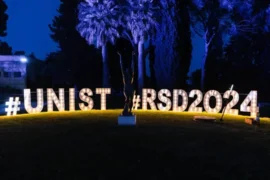
|
|
The 2024 International Regatta Sveti Duje took place in Split, celebrating its 22nd edition from May 10-12.
|
EUSA presents 25th Anniversary logo
13 May 2024
|
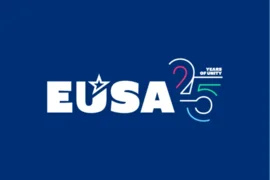
|
|
To commemorate 25 years of the existence of the European University Sports Association, we are presenting the special anniversary logo, created to mark and accompany this important milestone.
|
MEFOB Festival held in Hungary ahead of EUG 2024
14 May 2024
|
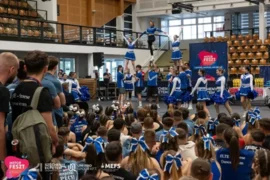
|
|
The MEFOB Festival (MEFOB FESZT) was jointly organized by the Hungarian University Sports Federation and the Széchenyi University with a venue in Győr from April 30 to May 3.
|
EUSA attends Youth in action activity in Cyprus
16 May 2024
|
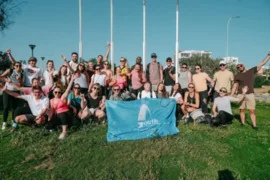
|
|
From May 8-12, in Larnaca, Cyprus, approximately 30 participants had the opportunity to attend an international activity within the Youth in Action program organized and facilitated by ENGSO Youth.
|
SELL Games 2024 successfully concluded
23 May 2024
|
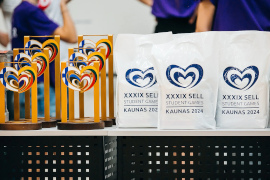
|
|
One of the largest sports events for students in the Baltic States – the 39th SELL Student Games was held between 16-19 of May, hosted by the Lithuanian Students' Sports Association in the city of Kaunas.
|
EUSA at the National Volunteering week 2024
24 May 2024
|
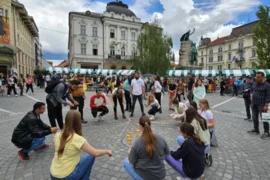
|
|
On 23rd of May, around 50 organisations were present at Prešeren Square in Ljubljana, Slovenia for the National Volunteering Week 2024, among which EUSA and EUSA Institute were also present.
|
Mid-term evaluation training for ESC Volunteers 2024
27 May 2024
|
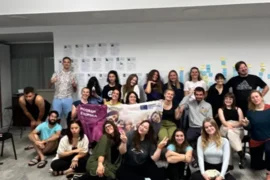
|
|
To keep the traditional program running, the Slovenian National Agency MOVIT, organized a four-day European Solidarity Corps midterm evaluation training from April 20-23 in Terme Čatež in east of Slovenia.
|
2024 EFPM online anniversary assembly
27 May 2024
|
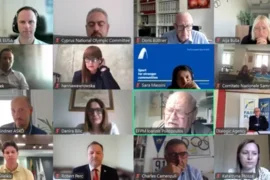
|
|
The European Fair Play Movement (EFPM) held their annual general assembly on May 27. The event was held online, commemorating the 30th anniversary since its establishment in 1994.
|
EASL elects new President
27 May 2024
|
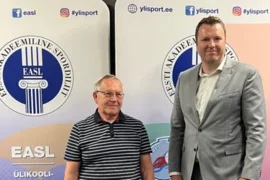
|
|
The Estonian Academic Sports Federation (EASL) held its General Assembly on the 24th of May, 2024 at the Tartu University Sports Hall in Tartu.
|
Road to SPORTO24: sustainability, sport and creativity conference in Ljubljana
28 May 2024
|
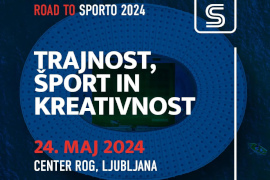
|
|
EUSA attended the Road to SPORTO2024: sustainability, sport and creativity conference held in Ljubljana on Friday 24th of May, at Center Rog in Ljubljana.
|
2024 European Universities Rowing Championship reassigned to Zagreb
28 May 2024
|
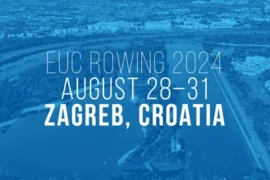
|
|
Following the announcement of the cancellation of the 2024 European Universities Rowing Championship in Ankara and consequential efforts in order to find a new host for the event in August, EUSA is happy to announce that EUC Rowing 2024 is going to be held in Zagreb, Croatia.
|
2024 EPAS annual meeting in Strasbourg
30 May 2024
|
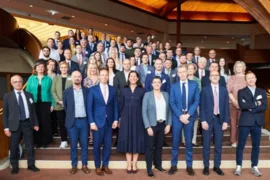
|
|
EPAS – Enlarged Partial Agreement on Sport, a body of the Council of Europe (COE), held its annual meeting of the Governing Board and Consultative Committee in Strasbourg between May 28 and 30, 2024; providing an overview of activities and bringing changes in the elected representatives.
|
|
 |
| FISU Section |
Initial FISU CDSU meeting held online
07 May 2024
|
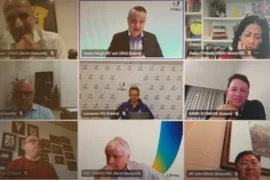
|
|
Committee for the Development of University Sport (CDSU) of the International University Sports Federation (FISU) met online for its initial introductory meeting in the current mandate today.
|
|
 |
| EUSA Insider |
Fabian Straub
|
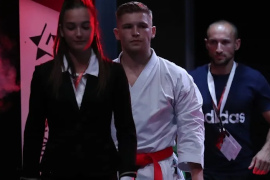 |
|
Fabian Straub
age: 24
athlete, Karate
University of Stuttgart
Germany
|
|
 |
| Important Dates Coming Up |
|
 |
| What's up! - Student Column |
Blind tennis - a sport over the horizon
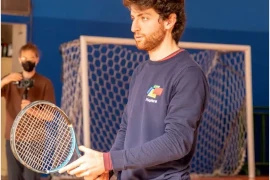 In this month’s What’s up student Column our EUSA Italian Civil Service volunteer Mr Simone De Luca elaborates on the topic of Blind Tennis A Sport Over The Horizon. In this month’s What’s up student Column our EUSA Italian Civil Service volunteer Mr Simone De Luca elaborates on the topic of Blind Tennis A Sport Over The Horizon.
It’s my great honour and pleasure to have the opportunity to write about the job of a dear friend who has turned his passion into a full-time job, dedicating himself to his personal growth and to the expansion of a sport that is still not so known. I decided to write an article about this practice so that people as my Italian friend could have the opportunity to share their story and raise awareness about a sport that is becoming more popular and important year by year. Today I have the pleasure to share the story of Simone Verre, a coach of blind tennis who gave me the opportunity to share this story with an interview that I will giving here question by question.
Who are you, why do you do this job?
Hello everybody! My name is Simone Verre and I’m a 27-year-old Italian who lives and works in Milan. I teach tennis for 4 years and blind tennis for 3 years. Tennis has always been a part of my life. I started playing tennis when I was six years old and it was love at first sight. From then I played constantly and I started my first training sessions in Qatar, being par of an amazing experience for the Doha tournament which takes place every year there. I was also a ball boy, and I was able to see different famous players, with this my passion grew even more. I still follow the tournaments almost every day and my passion about tennis in all its forms still give me a lot of satisfactions.
Why blind tennis, what motivated you to specialise in this field?
The opportunity to take Blind Tennis courses came in April 2021 when the company I still train for, called “Playmore!”, gave me the chance to follow Blind Tennis courses. For the first time I was surprised that blind and visually impaired people could play, a positive shock that gave me the chance to take an interest in this course and follow into it with more curiosity. This opened new possibilities such as being able to travel quite regularly to tournaments and competitions, both national and international. I took part in different tournaments like in Sopot and Krakow in Poland. In these competitions, beautiful team groups were created and new theories were applied to win the tournaments, dynamics that impressed me immediately and that involved myself personally. I felt that I grew up a lot as man and person, a touching experience that gives you a lot of satisfaction on a human level.
What motivated me to specialise in this field was the challenge of the sport itself, being able to teach people with visual limitations was very stimulating for me. In the beginning I realised how what I learnt before was basically useless, how all that guidelines on vision were unsuitable in that situation. So, it was a Copernican revolution for me initially. Due to my strong inclination to learn, I immediately felt involved, and I appreciated the way I worked with my players, I felt motivated by the positive effects of my lessons. There are people with extraordinary experiences, for example one of my players was a Paralympic champion in Turin in 2006. Honestly it’s always good for me to see them give their best, even when new exercises are proposed, there is always enthusiasm, the research for constant feedback obviously has its usefulness. What pushed me most to continue this path is based on two aspects, the first is the human aspect and the second is the technical one. I really enjoy follow my players and being able to always learn from them and being able to teach them something technically new (on the court).
What is blind tennis and how does it work?
Blind tennis is an adapted version of traditional tennis for the blind and visually impaired people, the visually impaired people are persons who have minimal residual vision but unlike the blind people they can see, and they have a different adapted version of the sport in question. Blind tennis was invented by a blind student from Japan in 1984 called Miyoshi Takei who wanted to play tennis with his friends, to solve the problem he invented this discipline. As far as the sport itself is concerned, there are four or five categories. In the first category, called B1, blind and visually impaired athletes are grouped together and when they compete, the athletes wear masks in order to level out the substantial differences between a player who is able to distinguish lights and shades from another who does not have this possibility, then we have other categories like: B2,B3,B4 and in some cases B5 (but this is very rare) where only visually impaired athletes play, they are divided into categories according to their residual vision. The court for category B1 players is half the size of a regulation tennis court, at the bottom of the court there are tactile lines that the players use to position themselves.
They have a limit of 3 rebounds, currently they use sponge balls a bit bigger than the classical balls with probes in them, these balls emit a sound that can arise them when the ball hits the ground or the racket. The players use slightly smaller rackets (halfway between adult and children's rackets, 23 or 25 inches). The category B1 has 3 rebounds available, category B2 has 3 rebounds available, category B3 has 2 rebounds available and category B4 has one rebound available. The other substantial difference is that the court of the visually impaired people is larger than the one of the blind people and there are no tactile lines because they have residual vision and can orient themselves. The size of the visually impaired court is slightly shorter than the normal field, so there is not so much difference. I would like to show you some statistics but unfortunately we do not have many data about Blind tennis like number of athletes in Italy or abroad.
What do you think are the obstacles, challenges, limitations?
Blind tennis is still a very sectoral sport, but the main challenge now is to involve as many people as possible with visual impairments, because most of the people are afraid to get involved, afraid to leave the house and be stigmatised, afraid to confront with something new, especially the youngest who suffer the most. Blind and visually impaired people also play to oppose this feeling of pity that other people can feel for them. According to my experience there is nothing wrong using the verb “see” because there is nothing offensive about it. What these people appreciate most is the fact that they are treated as persons. You have to be calibrated, but once you get into the mechanism of the group the best part is also to joke about everything without of course deliberately offend. This is also the stigma that we would like to fight (excessive respectability).
To give an example, a 20-year-old boy come for the first time to join his first lesson and from there he wanted to sign up and do a subscription with me because I shared with him the passion for this sport. I felt so proud because we got a young boy motivated, we found a solution together on the field and we managed to make him feel part of the group. The actual challenge is to make sure that so many more young people hear about blind tennis and get interested, we must raise awareness. The future dream is that (one day) blind tennis will be recognized as a total Paralympic sport and (one day) I will see my athletes play in the Paralympics. The sport is developing more and more, even if there are still some things to be defined, such as the teaching methodology and the scheduling of stable and regular tournaments. Of course, we are talking about a sport that still is a very sectoral reality, nothing to compare with, for example, blind football. However, blind tennis is establishing itself more and more in international level. This is a world where everyone knows each other well due to the still limited presence of athletes and coaches. In the future we hope that there will be many more people and in the same way an increase in competition in technical/tactical level as a result. In addition, these tournaments are a fantastic time of recollection where you can always innovate for example in one tournament, I had the opportunity to see Pakistani number 1 player in the world who played all the matches with knee pads. Thanks to him, I was able to invent a way to teach new styles and techniques of play. One big challenge on the blind tennis court is to find a way to increase the exchanges (serve/serve-response) try to improve the exchanges over 3 strokes.
What could we do to raise awareness and promote the sport both today and in the future?
In Italy is developing in some regions such as: Lombardy, Sardinia, Sicily, Friuli (where this year the world championship will be held in Lignano Sabbiadoro )and even in Bologna there are excellent players. Currently abroad they are doing a very good job at the level of involvement such as in Australia or in the USA, also in Japan there is an established tradition (because of origins), in Argentina, in Germany, in Spain, in Ireland and there are more and more countries where blind tennis is spreading, and this is very encouraging. Promotion through social channels or traditional one means to reach as many people as possible, there are also awareness projects in schools or companies, use blind tennis as a team building vehicle (my idea), these projects have already been done with great results. Obviously, the challenge remains to involve as many people as possible, including young people, also because it is not easy for them to leave home. Nowadays, it is possible to get these people to play sport, so we must work in this direction also because (trust me) is really satisfying to see the results on people “skin”.
At the end of this interview, I think it is very interesting to underline again the main points that Simone emphasized, the road of the blind tennis is still long and difficult. I personally think that stories like this can be an opportunity for everyone not only to know a new sport and a new environment in general but also to take advantage of these opportunities to better understand ourselves. What we can do to improve our relationship with blind people and could think about a project that can open something new for everyone, a new horizon beyond social barriers. I want to say thank you to Simone that has been available, open and super kind to share with me his story.
The author of this article, Simone De Luca, has an academic background in political science and international relations. He is currently a volunteer at the European University Sports Association as part of the Italian Universal Civil Service Program.
Are you a student with an opinion? We are looking for new contributors for our student column every month. Feel free to contact stc@eusa.eu to offer a piece or propose a topic.
read more >>
Your Data and Privacy:
EUSA GDPR: General Data Protection Regulation
Published by:
European University Sports Association (EUSA)
Office: Tomšičeva ulica 4, SI-1000 Ljubljana
Realisation/Main editor: Andrej Pišl
tel: +386 1 256 0056, web: www.eusa.eu
social: Facebook | Twitter | Instagram | Threads | YouTube | LinkedIn | #eusaunisport #myeusa
|
 European University Sports Association European University Sports Association 
|
|






















